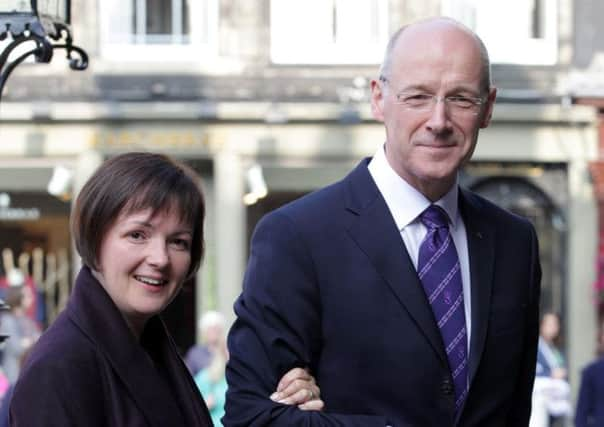Call to boycott ‘firms who scared Scotland’


But the show of solidarity comes against a backdrop of acrimony from Yes supporters amid calls to boycott Union-supporting businesses and an outbreak of violence between rival campaigners in Glasgow.
Advertisement
Hide AdAdvertisement
Hide AdAround 1000 people attended the Edinburgh service aimed at helping people in the Yes and No camps come together after the intense referendum debate.
Amongst them were Finance Secretary John Swinney of the SNP, Labour’s shadow foreign secretary Douglas Alexander and Better Together leader Alistair Darling.
Church of Scotland Moderator the Rt Rev John Chalmers, leading the service, asked Scots to put their differences aside and work together to redefine the country’s place within the UK.
Advertisement
Hide AdAdvertisement
Hide AdA web-based campaign called “The 45” – referring to the 45 per cent support for Yes in the referendum – has sprung up, supported by, among others, former SNP deputy leader Jim Sillars, who urged Yes campaigners to use their “consumer power”.
Eleven people were arrested after trouble flared in Glasgow following the referendum result. Loyalist No supporters reportedly charged pro-independence campaigners in the city’s George Square amid ugly scenes of chanting, jeering and Nazi salutes.
Liberal Democrat Chief Secretary to the Treasury Danny Alexander, Scottish Secretary Alistair Carmichael and former Liberal leader Lord Steel were also at St Giles’ yesterday, along with Scottish Conservative leader Ruth Davidson, Labour’s Johann Lamont and Lib Dem Willie Rennie.
In his sermon, Rev Chalmers evoked the spirit of Jimmy Reid, leader of the UCS shipbuilders’ sit-in in the 1970s, in appealing for people to show responsibility and act with dignity.
Advertisement
Hide AdAdvertisement
Hide AdHe said: “The untold energy of people who love Scotland and care about its future has been used up on opposite sides of this debate, now we have to find a way of harnessing all of that energy so that it can be used on the same side.
“When the late Jimmy Reid addressed the Upper Clyde Shipbuilders in 1971 – as they staged their sit-in – he said to them, ‘The world is watching us, and it is our responsibility to conduct ourselves with responsibility, and with dignity, and with maturity’.
“Actually he said quite a bit more than that. But we know what he meant and we know that his words are as poignant today as they were in 1971. The eyes of the world are on us – and it needs to see us conduct ourselves with responsibility, with dignity, and with
maturity. Post-referendum there are those who are elated, or at least relieved, and there are those who are desperately disappointed – ‘gutted’ is the description that I have frequently heard. Feelings like these will take time to heal and I want no-one to think that I think that there is a quick fix or an easy dusting down. For some, this referendum has been about national identity; for us, all it has been about is self-identity and that is about as close to the soul as it gets.
Advertisement
Hide AdAdvertisement
Hide Ad“So recovery and healing is a soul-searching matter and, for me, that is a deeply spiritual matter, so no quick fix. Instead, it will take a force of magnanimity and graciousness to restore equilibrium to both nation and individuals.”
During the service, Douglas Alexander and Mr Swinney both delivered readings to the congregation. Afterwards, Mr Alexander said: “Today Scotland is still a divided nation and we need to heal those wounds and bind ourselves together.
“When I extend the hand of friendship to my good friend John Swinney, I hope that gesture will be replicated around kitchen tables and workplaces and pubs and clubs and school gates in the days ahead.
“There are no longer No supporters, there are no longer Yes supporters. As fellow Scots we now need to come together and move our nation forward.”
Mr Swinney welcomed the church’s initiative.
Advertisement
Hide AdAdvertisement
Hide AdHe said: “I’m here to make clear the willingness of the Yes campaign to be part of taking the country forward in the light of the outcome. We shouldn’t be fearful of the referendum. The referendum was a democratic debate. I had one vote, everyone else had one vote and we exercised those votes and we did so freely, democratically and openly.”
However, some in the Yes camp have made clear their battle goes on. A Facebook page entitled “Boycott The Companies That Scared Scotland” carries the message: “We, the 45 per cent, must make a stand and show big business if they are prepared to scare and lie to the people of Scotland, then they must be prepared for what’s coming.
“It’s time to send shivers down their spines. 1.6 million people not buying their products or using their services will send a clear message, that we were not fooled by their dirty tricks. Never again can we have companies we use every day and contribute millions of pounds to tell us we’re too small, too poor and too stupid.”
A list circulated on Twitter named 27 companies – from B&Q to Waitrose – with the comment: “We will not forgive corporations interfering in constitutional affairs.”
Advertisement
Hide AdAdvertisement
Hide AdMr Sillars said if he did not get a free TV licence, he would have joined an anti-BBC boycott. On Twitter, he said: “We have lost political power (for the present) but Yes voters have enormous economic consumer power – use it.”